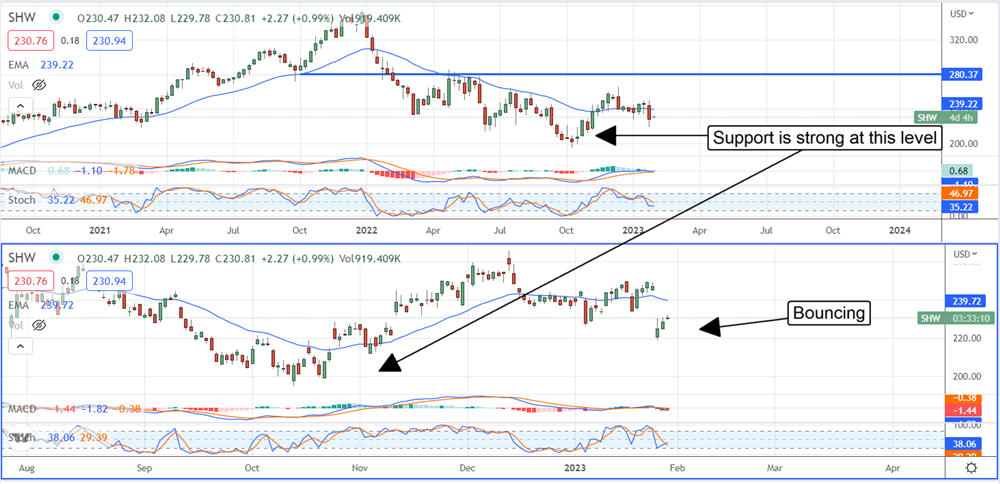
Sherwin-Williams Company (NYSE: SHW) shares have been in a downtrend for over a year but that may be coming to an end. While the near-term outlook suggests that more downside could be coming, the long-term chart of weekly price action suggests the market is near the bottom. What this means for investors is that it’s time to put this stock on the watchlist because a buying opportunity is close at hand.
The Q4 results revealed 2 things about Sherwin-Williams, and the first is that it is exposed to the housing market. No surprise there, it is a manufacturer of paints and has a well-established business in that market. The slowdown in new home sales and home sales, in general, has that part of the business in contraction despite higher prices, but that leads to the other revelation.
The other revelation is that Sherwin-Williams's other two business segments are still growing and offsetting the weakness. The takeaway is that 2023 may be a little iffy regarding growth on a segment basis, but the business is strong and can weather the storm. Eventually, the housing market will come back because it has to, there aren’t enough homes for those that want to move, and that will drive business.
When it happens, Sherwin-Williams will be set up to leverage the rebound.
Mixed Results Dull Enthusiasm For Sherwin-Williams
Sherwin-Williams had a mixed quarter with revenue and earnings, but the news that has the market under pressure is the guidance. The company missed the Marketbeat.com consensus mark on the top line but by a slim margin offset by margin improvement and strength on the bottom line.
The company reported increases in gross and operating margin on a GAAP and adjusted basis that left the adjusted EPS up 41% versus last year and a nickel ahead of consensus. Strength was centered in the Americas group, which grew by 15% and was offset by a small 4% gain in Performance Coatings and a 14% decline in the Consumer Group.
Turning to the guidance, the company is guiding for growth in Q1 and the possibility of flat revenue for the year. This is due to the housing downturn and the revenue and earnings outlook below the consensus estimates.
The bad news is that this guidance is based on current indicators, which are trending lower. There was a slight uptick in the Home Builders Sentiment Index for January but only slightly to levels that are still well below expansionary.
Sherwin-Williams Capital Returns Are Safe
Sherwin-Williams had to increase its debt over the past year, but this is not the red flag it may be. The increase is due to $1 billion in costs related to acquiring five new businesses, with the company’s market share rising.
The offsetting factor is that ex-acquisitions, the $1.92 operating cash flow the company reported for the year is more than enough to sustain the dividend and repurchases at the current levels of $883 million and $619 million.
The company might be expected, however, to slow down on share repurchases over time in order to grow the dividend. Sherwin-Williams is a Dividend Aristocrat verging on King that pays out less than 30% of its forward earnings outlook in dividends so the payment can be considered safe, regardless of the share repurchase outlook.
The Technical Outlook: A Rebound, Within A Downtrend
Shares of Sherwin-Williams are rebounding following the post-release drop but may not get far. The rebound has price action up near a potential resistance level, and the trend is still downward.
The upshot is that weekly price action shows the market near a bottom that could present a buying opportunity later in the year. Once the outlook for economic activity begins to brighten, this stock should be able to stage a solid recovery.














